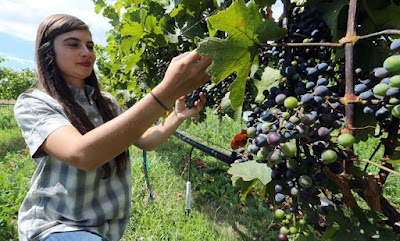Today, Colorado is home to approximately 170 wineries and
was rated by USA Today as hosting the best wine festival in the nation
(Colorado Mountain Winefest), but it hasn’t always been that way…
Young vines; photo courtesy of Colorado Wine
The first recorded planting of grapes in Colorado took place
in 1890 by George A. Crawford, the founder of Grand Junction, who planted 60
acres of grapes and other fruit in Palisade, CO. In 1899,
it was reported that 586,300 pounds of grapes were harvested and 1744 gallons
of wine produced. A decade later, this increased to 1,037,614 pounds of harvested
grapes. Prohibition was enacted in Colorado in 1916, which brought the industry
to a halt, and vineyards throughout the state were uprooted. Prohibition ended
in 1933, but it wasn’t until 1968 that the grape & wine industry took off
again.
Grand Valley AVA; photo courtesy of
Colorado Wine
 In 1974, CSU’s Orchard Mesa Research Station in Grand
Junction began vineyard research, and in 1982, the Rocky Mountain Association
of Vintners and Viticulturists, now known as the Colorado Association for
Viticulture & Enology (CAVE) was formed (www.winecolorado.org/). Further,
the Colorado Wine Industry Development Board was created in 1990 as part of
the Colorado Department of Agriculture (coloradowine.com/).
Also in 1990, the Grand Valley, from the mouth of the DeBeque Canyon in
Palisade to the foot of the Colorado National Monument in Grand Junction, was
recognized as a federally designated American Viticultural Area (AVA). And in 2001,
the West Elks region along the North Fork of the Gunnison River between Bowie
and Hotchkiss was recognized as its own AVA.
In 1974, CSU’s Orchard Mesa Research Station in Grand
Junction began vineyard research, and in 1982, the Rocky Mountain Association
of Vintners and Viticulturists, now known as the Colorado Association for
Viticulture & Enology (CAVE) was formed (www.winecolorado.org/). Further,
the Colorado Wine Industry Development Board was created in 1990 as part of
the Colorado Department of Agriculture (coloradowine.com/).
Also in 1990, the Grand Valley, from the mouth of the DeBeque Canyon in
Palisade to the foot of the Colorado National Monument in Grand Junction, was
recognized as a federally designated American Viticultural Area (AVA). And in 2001,
the West Elks region along the North Fork of the Gunnison River between Bowie
and Hotchkiss was recognized as its own AVA.
West Elks AVA; photo courtesy of Colorado Wine
What makes Colorado unique? Grapes in Colorado are grown between
4,000-7,000 ft in elevation; this is among the highest altitude grapes grown in
the world. Also, in Colorado we experience 300+ days of
sunshine each year, which hastens the ripening process. The grape growing
regions of Colorado have alkaline soils, which differs from other growing
regions, such as Napa Valley. Lastly, the dry climate experienced by the grape
growing regions in the state lead to low pest & disease pressure.
Miranda Ulmer, CSU Viticulture Extension Specialist; photo courtesy of GJ Sentinel
Fast forward to today, 90% of the grapes grown in the state
are grown in Mesa and Delta counties. Common varieties planted in Colorado include
Cabernet Sauvignon, Merlot, Cabernet Franc & Riesling. Colorado has a full-time
Statewide Viticulturist & Professor, Dr. Horst Caspari, as well as a
Viticulture Extension Specialist, Miranda Ulmer to support the research and
extension needs of the industry. Email miranda.ulmer@colostate.edu if
you would like to be added to the Viticulture Extension Newsletter email list
or visit us at viticulture.colostate.edu to learn about upcoming events &
ongoing research!




No comments:
Post a Comment